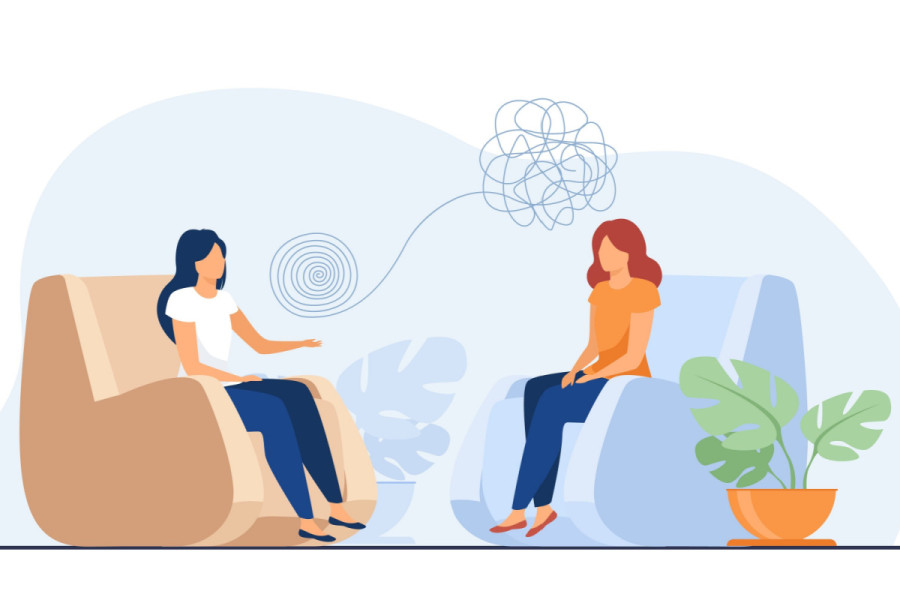Columns
For your mental health
If you are fighting a mental health battle alone, let people know if you need help.
Rebecca M Shrestha
Listen. Just listen. Listen attentively, and don’t let your personal biases or thoughts get in the way. Give your undivided attention to someone who might be struggling mentally. Spare 10 minutes of the precious 16 hours you are awake. Let’s do this to fight mental health issues around us.
As humans, we are too quick to make judgements. We look at a person and think we know what they are thinking or going through. We scroll through someone’s carefully curated social media profile and think, “She’s smiling, she’s out with her friends, everything in her life must be going well”. Unfortunately or fortunately, individuals with mental health difficulties do not walk around with a “HELP! Struggling Mentally” sign dangling from their necks. Yet, I wonder what gives us the confidence to make such assumptions about other people’s lives.
When was the last time you genuinely asked someone how they were doing with the intent of actually knowing? A half-hearted K cha? whilst staring at your phone doesn’t count.
The hard part is to be a good listener. More specifically, an active listener. The issue is that we often lack patience as we are either too entangled in our own thoughts or are ready with our opinions before the person speaking completes their sentence. The act of listening to someone speak without passing judgment, giving advice or making the conversation about ourselves is, in fact, quite difficult. You would be surprised to learn how much people open up when you listen and give them your undivided attention. This is a great gesture of kindness to the other person, no matter the topic.
Active listening involves focusing on the other person as they speak, letting them know you understand, asking questions and becoming empathetic. A 2022 study has shown that this strengthens attachment to the partner, increasing overall well-being. Put simply, take some time to put yourself in the person’s shoes and try seeing things from their perspective. You might sometimes think their issues are insignificant; however, there are no bigger or smaller problems. A person with a blemish on their face a day before their wedding may be equally stressed as the sole provider for a family of four who just got fired.
In any such scenario, the ongoing problem isn’t necessarily what needs to be addressed but rather how people feel about it. So listen without judgement, let them know you care and ask if you don’t know what to do. Ask them if they want comfort, reassurance, distraction or advice. We, as people, are not capable of knowing what the other person is thinking and, therefore, cannot assume we know the solutions to problems we cannot see.
It is advisable to, however, always keep in mind that we have our own biases and opinions and may not be completely versed in handling all kinds of problems—our words may sometimes end up harming rather than helping. It is crucial that we, as caring family members or friends, know when our help alone may not suffice for someone struggling mentally.
With this, we should encourage the person to seek professional help if they get worried or feel like they are not getting better. You may assist the person in finding a suitable mental health professional. Regarding psychologists, it may be useful to contact a few professionals before selecting your best fit. I like to compare finding a suitable psychologist to speed dating or shoe shopping, albeit a bit more expensive. Sometimes, you find the perfect fit right away, but you must try a few before you get to “the one”. As psychologists usually take numerous sessions to diagnose and treat mental health disorders, you must like the person you pour your heart out to. Finding that person may take some time, so it is essential to be patient and not stop seeking help if the first psychologist is not the perfect match.
In some scenarios, we might not want to leave our homes, and most psychologists offer online telehealth sessions as an alternative. Often, individuals are apprehensive to seek treatment because of what others might say if they find out. Every mental health professional must maintain adequate confidentiality. Whatever you say during a session must be completely private. Of course, there are a few exceptions to the confidentiality benefit of the person seeking help. If your therapist does not address confidentiality, make sure you ask.
It is crucial to understand that psychologists are not “problem-solvers”, no matter how much you get along with them. They assist you in developing the ability to deal with your issues rather than solving them for you. Psychologists equip you with the necessary psychological and behavioural tools, so you know how to manage a similar issue the next time you face it. However, if the mental health symptoms are increasing or the disorder requires medication, the psychologist may refer to other mental health professionals upon consultation with you.
So what can you, as someone’s “support system”, do in the meantime? Finding a suitable psychologist, going through therapy or taking medication is often not short and necessarily easy. Frequently checking in, meeting them, or just letting them know you are there for them if they need anyone (and actually meaning it) is of utmost importance.
Everyone fights their own inner battles. Like a physical fight, we sometimes cannot and should not always tackle our opponent alone, which is okay. For those of you who know someone battling mental health difficulties, offer to help them fight it. Most importantly, for those of you struggling in a mental health battle alone, let people know if you need help.




 9.6°C Kathmandu
9.6°C Kathmandu















